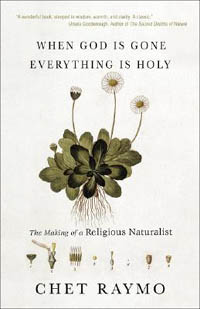 |
I’ve been a longtime fan of Chet Raymo’s Science Musings blog, a rich, wonderful merging of classical literature references and modern scientific awe I discovered not long after seeing the inspiring film he wrote Frankie Starlight. I’m sorry to say that When God is Gone, Everything is Holy is the first book of his that I have had the pleasure of reading, but it will not be the last.
The feeling I got reading this text is similar to the deep sense of peace I get reading Carl Sagan. Here is someone who echoes the thoughts in my mind, like when he refers to “truth with a lowercase t.” He even shares my fascination with the golden mean, finding a deep spiritual significance in it:
The golden mean is the secret of tolerance, of modesty, of a healthy skepticism–of knowing that every dogmatic definition of God is a pale intimation of the truth and, inevitably it seems, an excuse for jihad, pogrom or crusade.
Raymo was raised Catholic and went to a Catholic school, but reminds us, “The science I learned at Notre Dame was the same science that was taught at University of California at Los Angeles.” This is a sentiment echoed by my friends who attended private Catholic schools as children, that they were taught evolution and appreciation for the sciences that was completely secular.
Religion and science do not have to be at odds, and may, as John Updike notes, share in the wonder, when he wrote, “Ancient religion and modern science agree: We are here to give praise. Or, to slightly tip the expression, to pay attention.” Raymo knows exactly how to draw the line:
The religious naturalist foregoes a personal God. God defined in our own image. God invested with human qualities: justice, love, will, desire, jealousy, artifice, and so on–in short, the attributes of human personhood. To the agnostic, a personal God is the ultimate idolatry.
The word “God,” Raymo notes, “is indeed almost irretrievably burdened with personhood. It is our golden calf, our idol.” When I use the word “spiritual” in this sense, I am not referring to anything religious or supernatural, but rather a feeling. It’s the feeling I get when I see a sunset, a satellite photo of Earth, diagram of the solar system’s boundary, hear about some fascinating scientific fact, or anything else that instills a sense of awe at the world around me and inspires a profound appreciation for the simple fact of existing to experience it.
Raymo is a proponent of spiritual naturalism or naturalistic spirituality, and he finely articulates this sense of spiritualism:
So this is my Credo. I am an atheist, if by God one means a transcendent Person who acts willfully within the creation. I am an agnostic in that I believe our knowledge of “what is” is partial and tentative–a tiny flickering flame in the overwhelming shadows of our ignorance. I am a pantheist in that I believe empirical knowledge of the sensate world is the surest revelation of whatever is worth being called divine. I am a Catholic by accident of birth.
“Curiously, it was by abandoning the search for absolute truth that science began to make progress, opening the material universe to human exploration.” Chet quotes Charles Darwin, and then Lewis Thomas, “The greatest of all the accomplishments of twentieth-century science has been the discovery of human ignorance.” Raymo stresses the importance of recognizing our ignorance, and remaining humble to the vast realms of knowledge currently beyond us. “Only when a few curious people said “I don’t know” did science begin.”
“The capacity to tolerate complexity and welcome contradiction, not the need for simplicity and certainty, is the attribute of an explorer,” Charles Darwin wrote. At the core of the Intelligent Design movement, is an urging for us not to tolerate complexity, but rather throw up our hands and give up when faced with it. When Chet Raymo applies gentle scorn to the Intelligent Design movement, it is done with just the right rhetorical tone of persuasion, not mockery:
Gaps have a way of being filled. We no longer see God’s intervening will in the appearance of a comet, or look for divine meaning in the death of a child from disease. I would hate to think that my own faith in God depended upon scientists never figuring out exactly how the blood-clotting protein cascade evolved…
ID and other ideologies, both religious and political, stress humanity’s distinction from the natural world, and argue for our dominance over it. But Raymo argues that thinking ourselves separate from nature denies us total enjoyment of it. It almost sounds like a sin when he talks about it, just as humility about our ignorance sounds like a holy virtue.
This is the strength of Chet Raymo’s worldview, that he can find a spiritual sense of awe at the natural world, without having “imagine fairies beneath it,” to quote Douglas Adams. Enlightenment scholars look pessimistically around at all the churches, one on every other street corner, and despairs at the apparent overwhelming popularity of religion’s fantasy. Chet Raymo sees the opposite. Every school building, university, hospital, research corporation, space mission, car, streetlight, grocery store, museum, and other modern convenience is a monument to science and the natural world. A world we all share, and would all be better off if we simply appreciated it together.
Comments
One response to “Chet Raymo’s When God is Gone, Everything is Holy”